Samaira Shrestha: A young champion of LGBTIQ+ community
“I prefer to call myself a politician,” says Samaira Shrestha who was recently selected as a central committee member of the Bibeksheel Sajha Party. There, she leads the Indreni department, a cell especially dedicated to the LGBTIQ+ community, the first such section in a Nepali political party.
Shrestha, 22, a transwoman, has always dreamt of working for her community. She feels lucky to have her family’s “100 percent support” for her chosen sexual orientation. “But despite the family support I faced considerable challenges outside my home,” she says, recalling her days at school where she was bullied and harassed by teachers and colleagues alike. Things were no better in her home community.
“My family does not place any kind of restrictions on me,” she says, citing the reason for her active community participation these days. By profession, Shrestha is a model and a theater artist but now she is more into political and social activities.
Shrestha says her political involvement was not preordained even though her parents and grandparents always encouraged her to play an active part in the society. “It is hard dealing with our straight-patriarchal community yet I am determined to make a mark in it,” she says. For one, Shrestha wants more political and community leaders to emerge from the LGBTIQ+ community.
When nearly the whole world was under lockdowns, there came a major turning point in Shrestha’s life. She underwent a gender reassignment surgery and was on complete bed rest. Shortly, she started a YouTube channel to communicate and overcome her introverted nature. At that time, she heard about a woman in a Covid-19 quarantine facility being raped by a police constable in Sarlahi. “It surprised me that my friends took this incident as normal,” says Shrestha. Considering the social and emotional toll on the woman victim, “the government was completely incompetent to do her justice.”
In the meantime she also saw on social media posts about the “Enough is Enough” protests, partly organized against the government’s mishandling of the Covid-19 pandemic. She decided to join the nonviolent resistance, including by going on a hunger strike. “In those nine days of hunger strike, my whole outlook on life changed,” says Shrestha.
A pet lover, Shrestha slept with street dogs and homeless kids during her stay at Basantapur in course of the strike “At least I had a blanket with me. But what about the people who are forever homeless?” she questions.
In Basantapur, many people, mostly youths, visited her regularly and lent her strong support. “It was such a beautiful exchange of positivity,” Shrestha describes the anti-government protest. “I was lucky to be a part of the strike that helped create social consciousness among the youth.”
The social activist believes it is the responsibility of citizens to hold their government accountable. “In a democracy like Nepal, we the people are the kingmakers and it’s upon us to keep the government honest,” she says. “If you love your country, what you cannot do is turn away from politics saying it is a dirty game.”
Compared to the past, today’s youths, Shrestha reckons, are more concerned about their country’s fate. But she also worries a lot about members of the LGBTIQ+ community in Nepal who lack awareness, basic rights and education. They also face considerable mental and physical traumas. Also, the state treats them like strangers as same-sex marriage is yet to be officially recognized in Nepal. Moreover, even though she identifies as a woman, Shrestha still has a citizenship that categorizes her as a male.
People advocate for the better treatment of the LGBTIQ+ community but real acceptance is still rare. Shrestha hopes everyone was a little more empathetic to the members of the community and allowed them to live the way they want to.
A musical letter on your home screen
The fourth edition of the annual “Echoes in the Valley” (EITV) music festival started on April 10 with this year’s theme ‘A Letter Home’, featuring Nepali musicians living abroad. Usually, EITV is a one-day music festival, but due to the pandemic, the organizers have turned it into a year-long virtual event.
The EITV festival has four programs starting this year: Confluence, EchoesMusicFund, Kaleidoscope, and Opener. EchoesMusicFund is sponsoring two candidates for music education, while Kaleidoscope offers a six-month long mentorship program for new Nepali artists. Likewise, under Confluence one can have engaging discussions on music with experts on the field and finally, the Opener allows emerging musicians to perform onstage and be exposed to larger audience.
For more information, ApEx sat down with EITV’s festival director, Bhushan Shilpakar. Excerpts:
How did this festival first come about?
Rizu Tuladhar and Sunit Kansakar from the band KantaDabDab are the festival’s creators and co-founders. Although Nepali music is diverse, not a single music festival is dedicated to traditional and folk music. They saw this as an opportunity to start something new and I jumped in right away when they came to me to brainstorm this idea in 2016. After the launch, our friends from Kutumba, Night and Phatcowlee joined forces in 2019.
What does a typical ETIV music festival look like?
In the three past editions of our festival, we transformed small neighborhoods into grand stages for musical conversations. In 2020, because of the pandemic, we cancelled our plans to have the festival in Kirtipur. But this year, we are changing our format and featuring artists/bands based outside Nepal. Hence this year’s theme is ‘A Letter Home,’ where each performance is followed by a candid conversation with the featured artist.
How much will it cost to get invited to the virtual festival?
Everything is free. A free dose of music and more from the safety and comfort of your homes. You just need to follow our Facebook, YouTube and Instagram pages.
Who will be featured in this year’s festival?
We have made sure that young musicians, especially those who are learning music at schools or are just starting to get into the scene, are given a chance to perform at our festival, and are able to share the stage with other more ‘well known’ musicians.
Just because it’s virtual doesn’t mean we will stop that tradition. We made an open call for applications for Opener and we selected nine artists/bands to kick start the festival with their performances. Aside from that, we have a great lineup this year. Some of them are: Amazumi (Belgium), Bartika Eam Rai (US), Chepang (US), Cloverleaves (UK/Nepal), Dheeraj Shrestha (Australia), Diwas Gurung (US), Kathmandinki (Finland), Sanskriti Shrestha (Norway), Shreya Rai (UK), Shristi (US/Nepal), Shubha G (UK), Shyam Nepali (US), The Heart of Nepal (US), Topi (US) and Wayam (Belgium/Nepal).
What kind of discussions will you have under Confluence?
This was a component we added in 2019, where we discuss important aspects of music. For the discussion we gather stakeholders including musicians, music educators, students, and policy makers. Confluence will be held under the theme of music rights and artistic freedom. There will be a keynote speaker, panel discussions and an open floor, everything would be live online. We will call for participation starting the second half of this year.
Will the festival be live-streamed like a concert or be recorded and made available only on YouTube?
We want to provide seamless entertainment to our audiences. Some band members are not in the same cities or country, so we need to keep in mind issues like time differences between artists/bands and the interviewers for the conversations, fluctuating internet access, power cuts, and other unforeseen glitches, so we decided to have all performances and conversations pre-recorded and premiered on respective dates.
Can you elaborate on EchoesMusicFund and Kaleidoscope scholarships?
We are always asking ourselves, how can we make things better or easier for young musicians, who simply love music but may have difficulties to continue pursuing it? For EchoesMusicFund this year we have collaborated with Kathmandu’s two finest music institutes—Kathmandu University Department of Music and Kathmandu Jazz Conservatory. They will pick two students who will receive scholarships on a need basis.
Kaleidoscope is a six-month-long fellowship program designed for emerging musicians that includes mentorship, musical research, exclusive artist residency in Banepa, public performances, professional studio recording time, and the experience of making a music video with the industry’s best. We will do an open call for this program before the first half of 2021.
When you say you’re only featuring Nepali artists living abroad, does that apply only to Openers or to all programs included in your festival?
We were expecting only Nepali artists living in Nepal to apply for Openers but PSNOBS applied from the UK. So we selected them, the rest are all from Kathmandu.
We admit we have our shortcomings. One of the things we could have done better was to reach out to more artists from all over Nepal and not only Kathmandu. We are constantly learning with every edition. Next year, if the pandemic is over and everything goes according to plan, we will have the most versatile show we have done till date.
Five delicious dosa places in Kathmandu
A quintessential South-Indian cuisine, dosa has become a mandatory item for Indian-style vegetarian restaurants in the town owing to its popularity among Nepali restaurant-goers, not to mention among the many Indian tourists and foreigners who want a taste of India in Nepal. Finding an authentic taste, and the best combination of dosa and sambar, might be tricky though.
Here are five places that give you the best dosa experience in Kathmandu.
Pawan Sweets
Service Hours: 9am-8pm
Contact: 01-4252165
Location: Durbarmarg, Battisputali
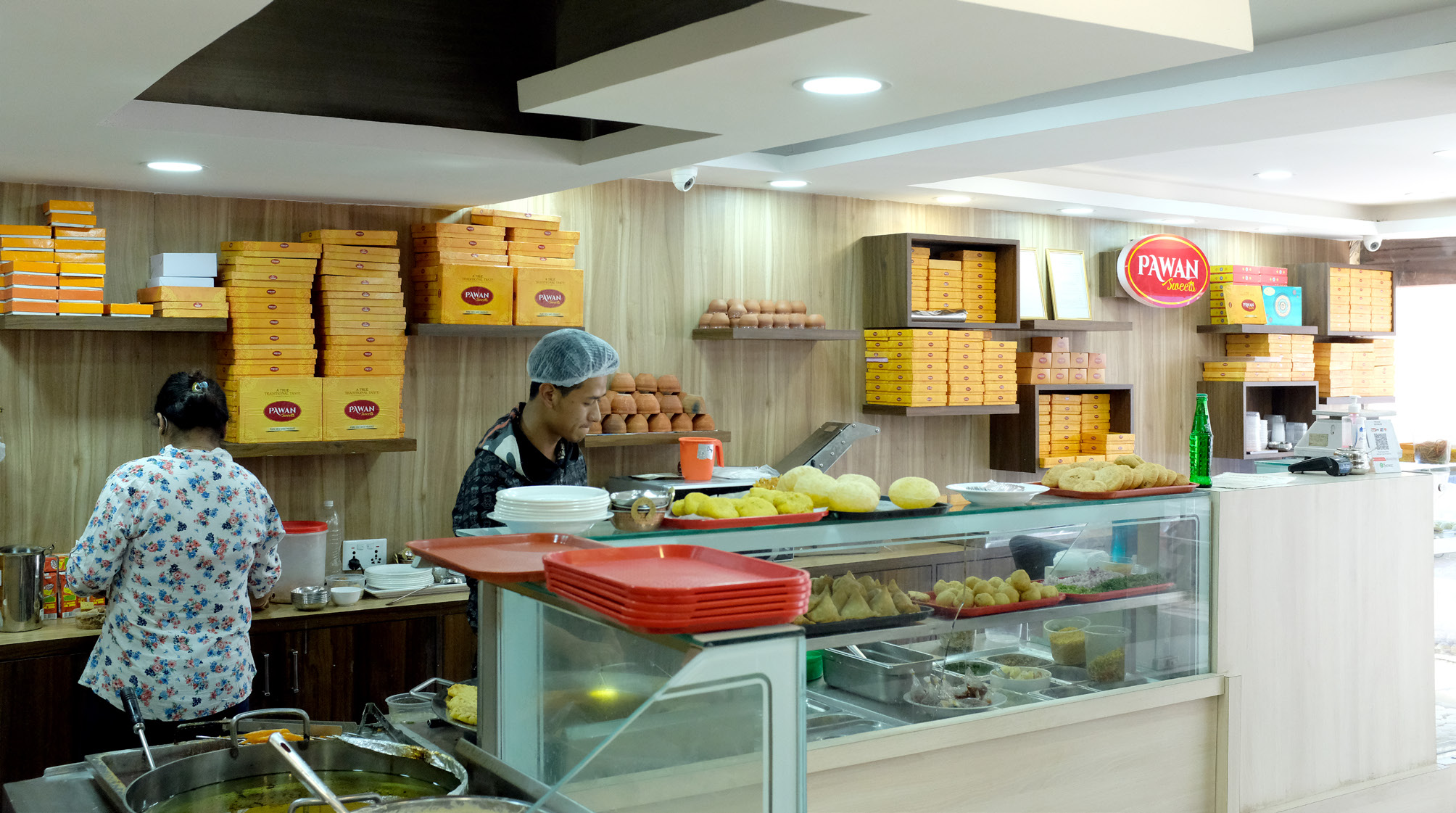
Even though the restaurant was established only in 2019, Pawan Sweets has already made a mark among Indian food lovers of Kathmandu. With branches in Durbarmarg and Battisputali, Pawan Sweets boasts of authentic Indian chefs who offer 10 varieties of dosas. The highlights of its menu: plain, butter masala, paneer masala, pizza, and pepper cheese masala dosas.
It is also famous for its Bahubali dosa, which is almost the size of a table and can feed numerous people at a time. Another signature dish is the Pawan Special dosa that prioritizes the taste of dry fruits in the cuisine along with a secret topping. Meanwhile, masala dosa and the Pawan Special dosas are “fan favorites”.
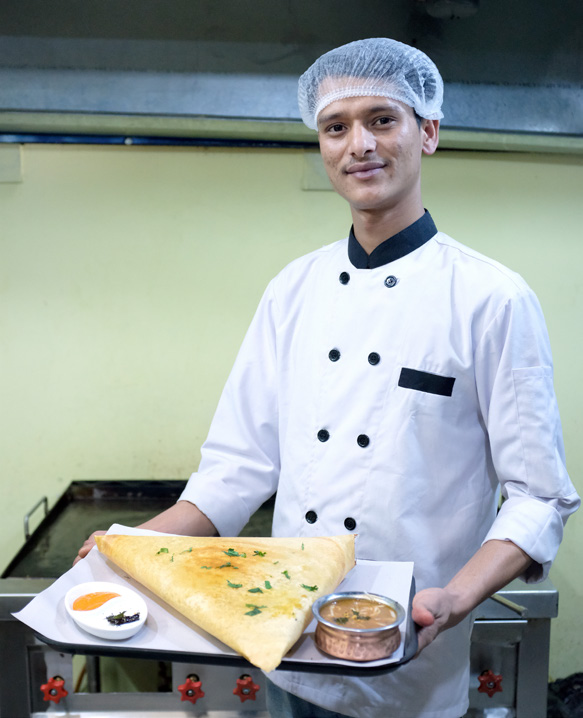
“Our Sambar is well-loved,” owner Binod Devkota says. “We use fresh vegetables to make it. Seasonal ingredients are usually stocked. And because of that the taste of the sambar is always consistent, no matter the month.” The dosas are offered in both cylindrical and triangular shapes, depending on the order.
Nandan Food Nepal
Service Hours: 8:30am-8pm
Contact: 01-4241498
Location: New Road
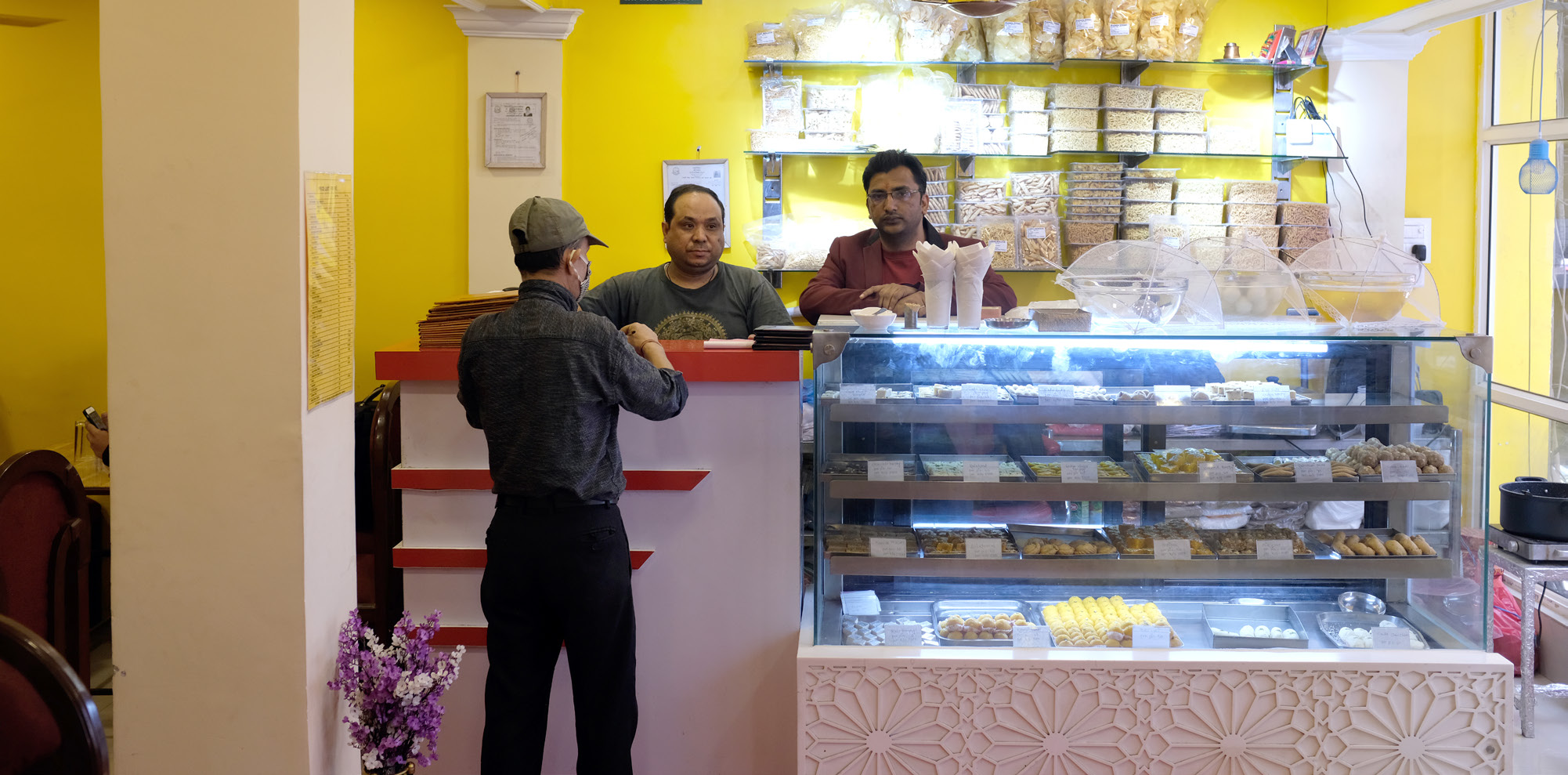
Nandan Food Nepal in Pyukha Marg, New Road, has been making dosas for almost 29 years. At the start, they brought chefs from South India to give dosa-lovers an authentic taste of the dish, and their legacy continues. Trained Indian chefs today bring to you more than six varieties of dosas and an array of brilliant South Indian snacks.
“Most of our clients opt for our Special dosa,” says Bimal Thapa, who’s been the manager of the restaurant for past 27 years. “The Special dosa uses extra ingredients like potato and dry fruits. Customers who’ve tried it once usually order it next time also.”

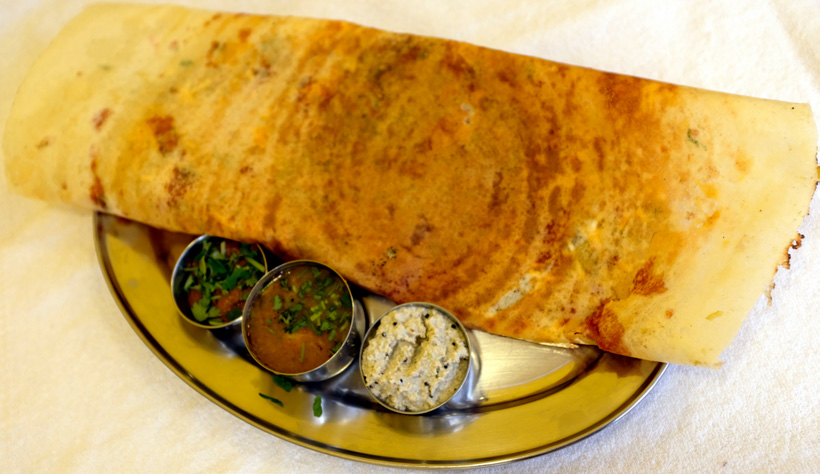
Its South Indian sambar with a mixture of fresh vegetables and grinded lentils is equally beloved. The dosas are long and cylindrical, perfected with years of expertise and tailor-made for Nepali palates, making them among the best in Kathmandu.
Gupta Bhojanalaya
Service Hours: 7:30am-9:30pm
Contact: 01-4248205
Location: Chhetrapati
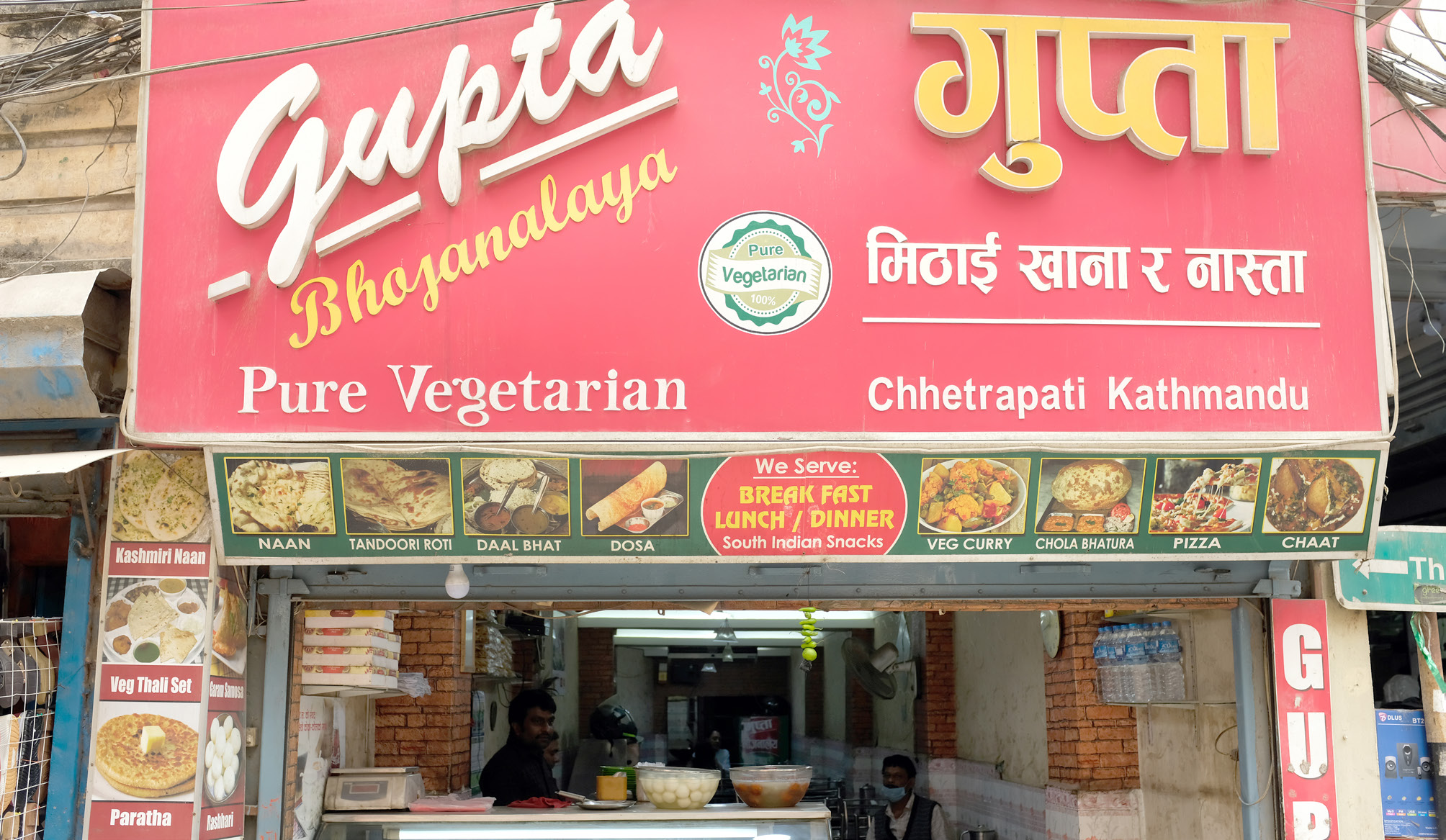
Another restaurant under foodies’ radar for the past 20 years is Gupta Bhojanalaya. Extremely popular among locals and students in the area for affordable and delicious foods, this bustling restaurant offers dosas between Rs 150 to Rs 300. For dosa-lovers, the restaurant currently has eight varieties along with sweet and sour sambar. Like others, Gupta Bhojanalaya uses dry fruits to make their Gupta special. Mushrooms and potatoes are used to give customers “the best dosa-experience”.
“Masala dosa is the bestseller,” says Sunil Gupta, the restaurant owner. “The dish sits well on Nepali taste-buds and our prices are also reasonable.” The dosas come not just in cylindrical shapes but also in unique cone, plate-fit shapes.

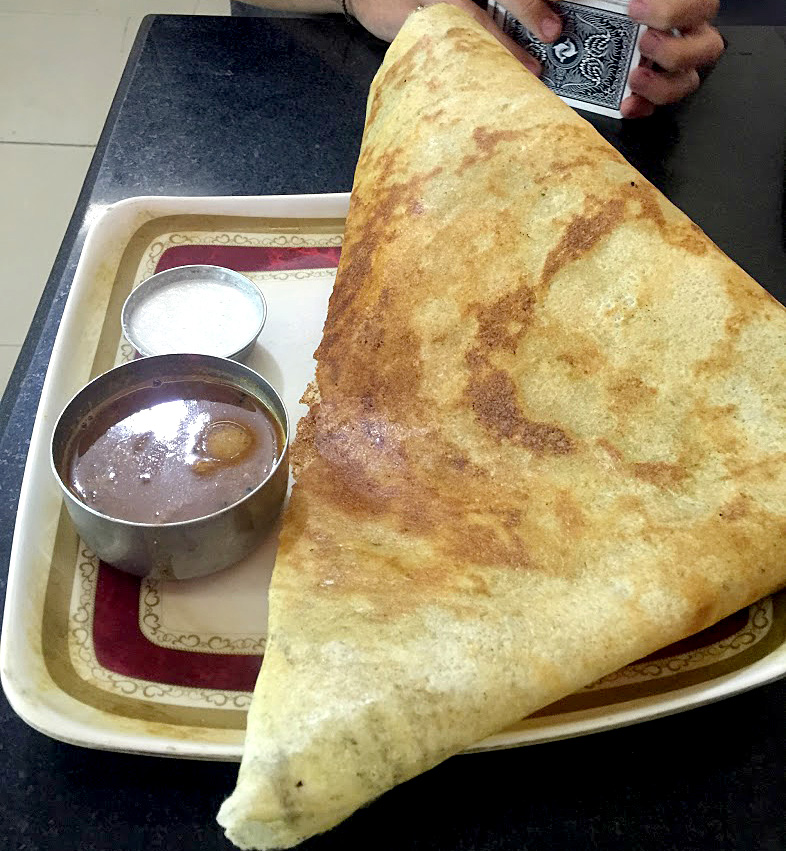
Located at Chhetrapati Chowk, Gupta Bhojanalaya right now has only Nepali chefs cooking South Indian dishes. But that doesn’t mean it compromises on service or dosas.
Tip Top
Service Hours: 10am-7pm
Contact Info: 01-5544735
Location: Kuleshwor, Lagankhel, Maharajgunj, Gyaneshwor

Nestled in a tiny New Road alley, Tip Top is a household name for Kathmandu’s samosa lovers. But many don’t know that for the past several years, it’s also been serving dosas from its branches in Kuleshwor, Lagankhel and Maharajgunj.
“While we’ve stayed true to our dishes’ South-Indian origins, we’ve also made sure some dishes are suited to Nepali palates,” shares Dinesh Agrawal, manager of the restaurant chain. So, even though its masala dosas have been slightly modified, it continues to be savored up by Nepali and Indian customers alike. If you’re looking for authentic South Indian taste, the restaurant also has seven other varieties of dosas to choose from.
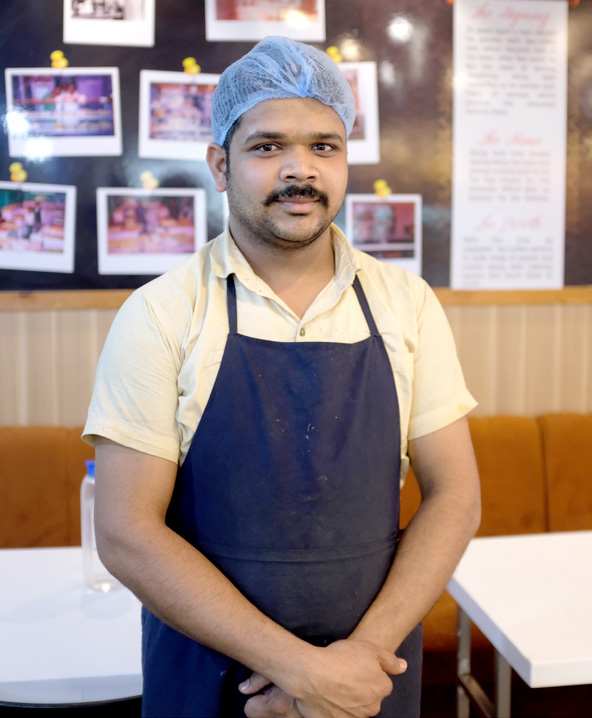

The crispy dosas, priced between Rs 240 to Rs 300, are served with veggie sambar, coconut chutney, and onion chutney. With an additional outlet planned at Gyaneshwor, you should be able to easily access Tip Top dosas easily, wherever you are in town.
Coconut Restaurant
Service Hours: 7am-7pm
Contact Info: 9813335420
Location: Bouddha
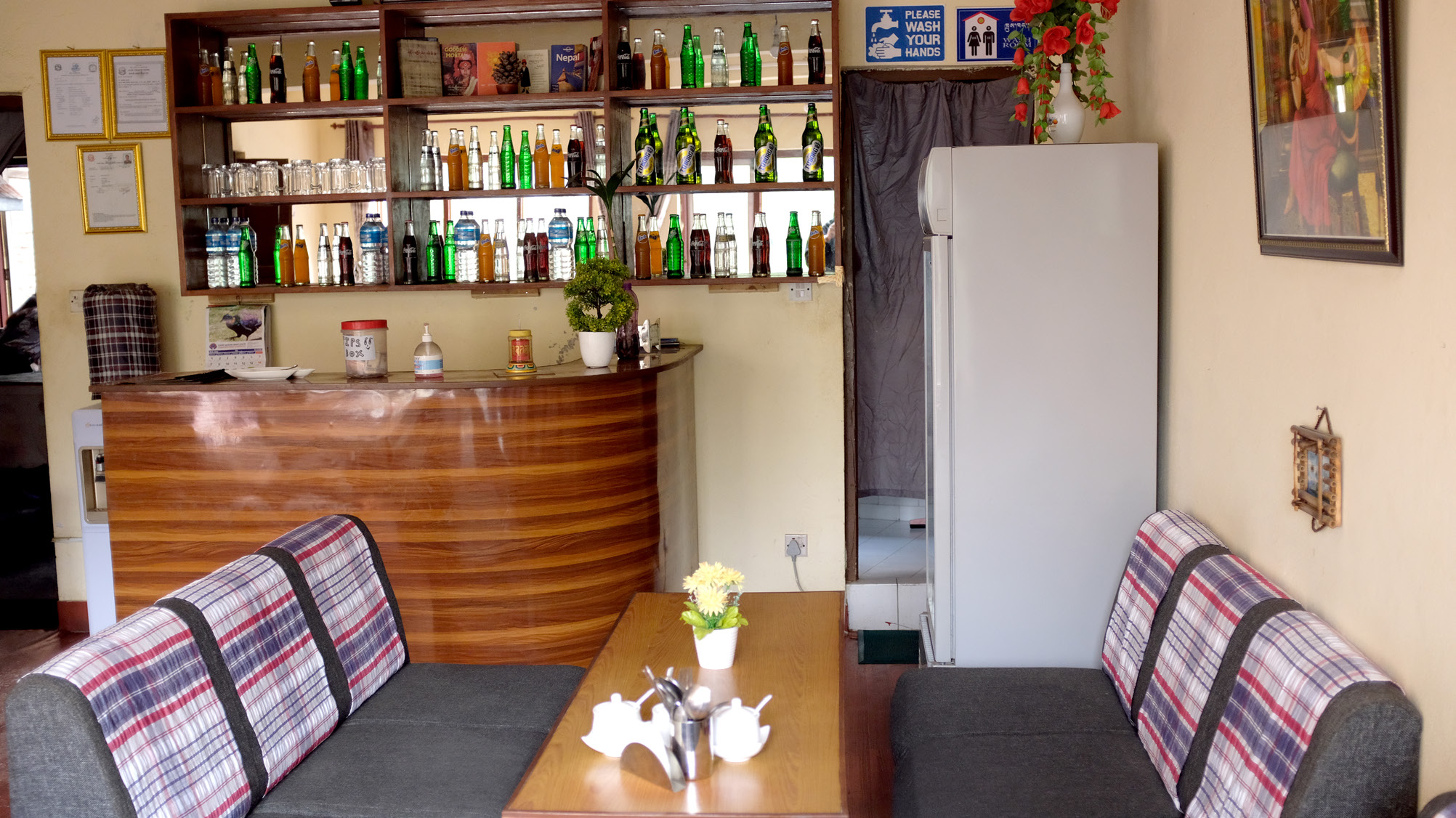
Within two minutes’ walking distance from Boudha Stupa and a few meters from Himalayan Java is Coconut Restaurant. The South Indian eatery is bang in the middle of the UNESCO World Heritage site crowded with all sorts of restaurants. Finding this particular restaurant might be hard, but not impossible, if you ask around the area and follow Google Map.
The restaurant offers six varieties of dosas—masala, plain, egg, onion, butter, and set dosa—served with coconut chutney and dal sambar. If you visit early in the morning, the restaurant also serves dosa with potato sambar. Customers enjoy having the dosas with chana curry cooked in coconut oil—a side dish that you need to pay for separately—to highlight the taste of coconut chutney.
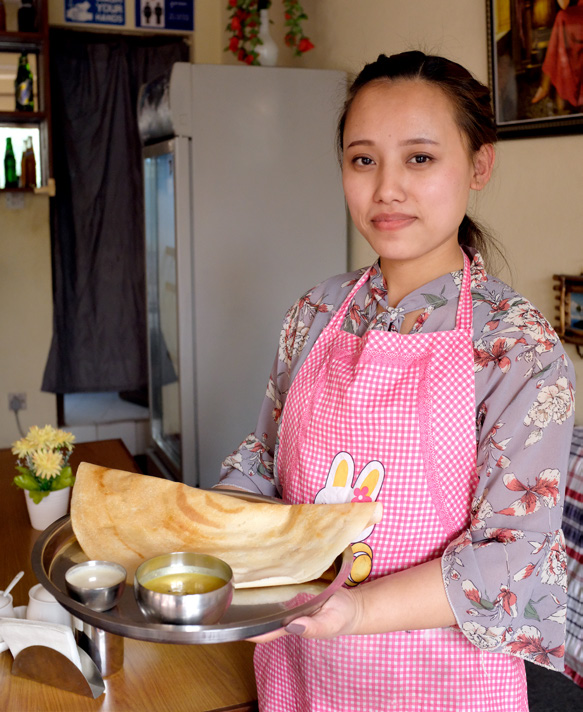

With South-Indian chefs in the kitchen, Coconut Restaurant tries its best to retain the authentic taste and quality of its dosas.
Sabda Sangram gets Nepal rapping online
Nita Pradhananga always dreamt of entering the Nepali rap scene. She thus came up with the idea of a rap-battle show on television. But three days before she was supposed to pitch the idea, the country went into a lockdown.
That didn’t stop her though.
A month into the quarantine, she, along with her neighborhood friends Pritam Shakya, Labesh Shrestha and Rubin Pradhan, started Sabda Sangram (‘Word War’), an online rap battle show. Featuring contestants from all over Nepal as well as abroad, writing lines, spitting bars and competing from their homes, Sabda Sangram has since last year seen substantial success and is already well into its second season.
Since the show went live, Sabda Sangram’s core team has grown as well. Additional members—Brihat Boswa on documentation and script-writing, Binod Maharjan (popularly known as DJ BKnot) on sound, and Rujal Pradhan on backend—have taken the show to new heights. Participation doubled—from 16 contestants in the first season to 32 in the second—and their YouTube channel, Sabda Sangram, where the show’s weekly episodes are uploaded, now has 188k views.
“Right now, we’re mostly gearing up for the finale,” shares Pradhananga. “We’ll have the battle on April 13 and the winner of the second season will be announced on April 16.”
In the first season, the auditioning process for the show was simple. Prospective contestants only had to send a personal video of them rapping to the lyrics they had written for the audition. But there was no way for the showrunners to verify if the lyrics was original or if it had been written within the one-week timeframe. After learning of their blunder, for the second season, the team created their own beat for the audition to which all interested participants could create bars and rap.

Two competing participants are paired off in the show that is completely virtual. The participants send rap videos and team editors compile them to make an episode. After uploading it on the channel, there is live voting. Sabda Sangram has a website where you can vote for your ‘favorite of the week’. And the person with the most vote moves to another round. This goes on until the finale.
In the first season, the winner got a cash prize of Rs 10,000. The prize has been increased (and how!) in the second season. Now the winner gets Rs. 15,000 in cash, he or she can pursue a Bachelor’s or Master’s degree at IIMS College, in addition to getting Rs 10,000 worth of free service from Vaidurya Dental Clinic and 35mbph free internet service from Vianet.
Although there have been participants from as far afield as Qatar and Malaysia, most of the hype has been created from eastern Nepal, and most of the final contestants are from outside the Kathmandu valley.
“Sabda Sangram gave me an invaluable outlet during the lockdown,” says Ankush Adhikari, also known as WLF KUSH to fans. “It gave me an incentive to write at a time I was feeling demotivated. The exposure I got is irreplaceable.” Adhikari is recognized for winning the first season of Sabda Sangram and has since earned many more fans near and far. At 24, he’s sure of a long rap career that is ahead of him.
His statement is seconded by the finalists of the second season. “Learning how rap battles work, understanding that you can make music from the setup you have at home, and meeting people through the show has built my confidence,” shares Jagrit Pun, 22, from Nawalparasi. Known as REX, Pun will soon be battling for the second season’s trophy. “As I envision my future in music, I’m learning how to produce and build my fan-base at the same time. It’s immensely motivating to see your effort rewarded.”

For another finalist, Kabi Wraith, 25, Sabda Sangram was his first introduction to the hiphop community. “I’ve always been more of a classical and rock guy. But this show has pushed me out of my element and forced me to research components I never thought I’d find interesting.” He confesses that he also greatly enjoys the process of rap battles—the writings, the rapping, the beats, the battles, all of it.
But bringing rap back into musical spotlight hasn’t been easy and the biggest hurdle continues to be financial. “We’re funding the show on our own right now,” Pradhananga says. “Sabda Sangram is my baby. And it will go on. But with a big team working with equipment and snacking in restaurants, bill payment is often a problem.
Another problem has to do with the internet. Many participants are from outside the valley as well as abroad, and often their videos don’t arrive on time. As the show runs on schedule, the editing team is then under a lot of pressure.
Right now, Pradhananga is trying to get Sabda Sangram to an actual stage. After finishing the second season, the team will try to air the third on TV.





















